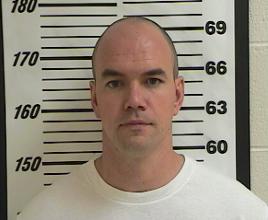
“This court is broken!” shouted Ashley Sanders, a member of DeChristopher’s activist nonprofit Peaceful Uprising, who was in the gallery. “Is this a corporate court or our court?” DeChristopher’s supporters responded, “Our court!” and began singing protest songs.
After U.S. marshals dragged Sanders and Peaceful Uprising codirector Ashley Anderson from the courtroom, another DeChristopher supporter stood up and yelled, “This judge is a spineless bastard!”
Those protests, however, were mere theater compared with the 35-minute DeChristopher read to the court prior to his sentencing. The activist knew it could be his last public speaking gig for a while, and he made the most of the opportunity.
His tone was respectful yet confrontational. He thanked Judge Dee Benson for the chance to speak and noted that it was the first time the judge had looked him in the eye. DeChristopher went on to make a few less subtle digs at the government, ridiculing the math of the prosecutor, U.S. Assistant Attorney John Huber, who suggested DeChristopher cost the BLM $900,000; referencing a past Department of the Interior scandal in which officials were “literally taking bribes of sex and drugs” from industry lobbyists; and bringing laughs from the courtroom when he suggested that Judge Benson sentence him to “pull weeds” for the BLM.
DeChristopher did not ask for forgiveness, saying that his intent in disrupting the auction was to “expose, embarrass, and hold accountable the oil industry.” He said that he would likely engage in civil disobedience again.
“The people who are committed to fighting for a livable future will not be discouraged by anything that happens today,” he said. “And, frankly, neither will I…. You have authority over my life but not my principles.” Even Judge Benson later conceded that it was “a fine speech.”
Four times, DeChristopher asked Judge Benson to “join” him in valuing civil disobedience as a legitimate tool for concerned citizens. He also suggested an alternative, saying that if the judge wished to maintain the status quo and value corporations over citizen rights, he should “lock me away for an extended period.”
That’s exactly what Benson did. Explaining his decision, the judge said that DeChristopher’s lack of repentance and repeated contributed to his term, which is heavy for a nonviolent act of protest.
“I’ve waited and hoped for Mr. DeChristopher to show respect for the rule of law,” he said, later continuing, “he keeps saying things, and I think, Does he really want to say that, knowing that I’m going to sentence him?”
Benson also said that civil disobedience “can’t be the order of the day.” In a telling moment, he noted that if oil companies were allowed to act with impunity on the basis of their deepest beliefs, they might conduct civil disobedience by drilling public lands at will. Some might point out that civil disobedience is, by definition, a tool used to illuminate abuses of power and that any calculus equating the moral standing of a citizen with that of an oil company is at best problematic.
Finally, Benson echoed prosecutor Huber’s assertion that DeChristopher’s prison term would act as a “deterrent” to others who might disrupt government affairs with political protests.
Soon after the courtroom emptied, a throng of DeChristopher supporters the intersection of South 400th and Main streets, blocking traffic and Trax, the city’s train system. Eventually, 26 were led off to jail, singing and raising their fists. They did not seem particularly deterred.
—Abe Streep